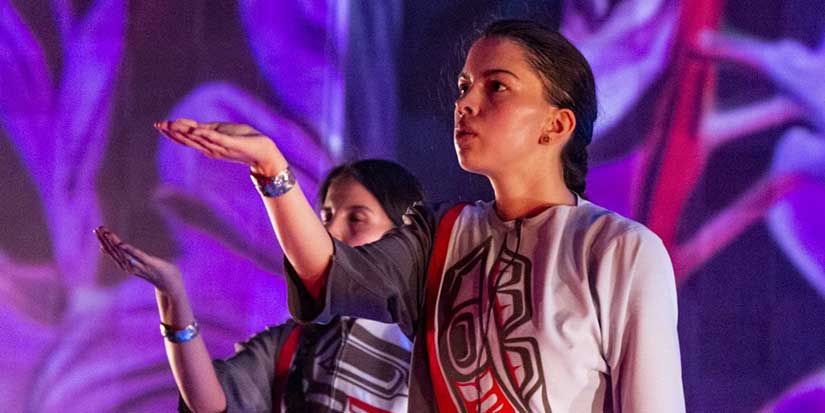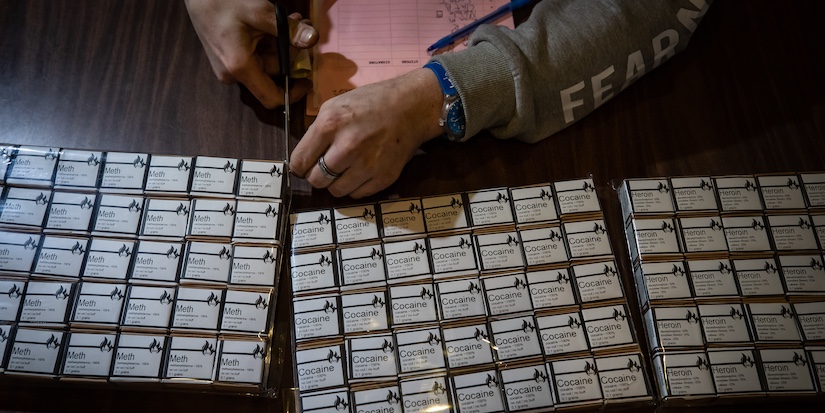Arts & Culture
Deeply connected to Richmond’s past, Mînowin looks to the future
Published 4:31 PST, Thu November 21, 2019
Last Updated: 2:13 PDT, Wed May 12, 2021
—
Heading from Musqueam territory on Sea Island Nov. 21, I saw the opening of Mînowin, Dancers of Damelahamid at the Cultch’s historic theatre. I was aware it was once a church of colonizers.
Ian Campbell from the local Musqueam and Squamish Nations, a descendant of Chief Khatsahlano (Xats'alanexw), welcomed the audience. Telling how his elders always answered his questions with a story, a story of transformation and growth.
Campbell then offered a song from the late Dominic Point, also from Musqueam.
The Point family lived on their hereditary land, at what is now called Garry Point, in Steveston. According to Musqueam elder, Mervin Point, when the government agent wouldn’t allow the family to keep their own names, they refused the English last names he tried to give them. Saying instead they should have the last name, Point registered in protest.
The song Point passed on to Campbell was older than written time.
“It’s a Musqueam paddle song that we sang when travelling on the Salish Sea or to welcome paddlers to our village,” Campbell said.
He then sang in a rich, deep voice; his drum resonant and clear until the song faded into silence.
A moment later, laughter erupted when he said, “Now, I’ll take my drum and beat it,” as he exited the stage.
In what was once a Christian church, I was aware that Bible stories date back two or three thousand years while the stories we were watching were many times older than that, from the depths of a long and rich history.
The performance began. The dancers continued for well over an hour without a break. The motions smooth, the footwork steady and true. It takes great strength to dance with such grace. It takes stories older than the pyramids, history as old as time, a sophisticated culture, and dancers of great skill to put together something this awe inspiring.
There was humour, when some of the dancers personified animals with regalia and masks, their graceful movements echoed the animal they were. Some were powerful, some sailed through the imaginary water, while others trotted about bobbing their bird heads just like the one they were meant to be.
New technology moves the old stories ahead into the 21st century. When the orca dancers came out, they had illuminated dorsal fins in Coast Salish design. The circle on the floor swirled with images for each dance piece. At first, is was an ever-changing galaxy of starts in colours of turquoise and mauve. Another time it was water flowing.
The interactive new media was subtle and breathtaking. The set deceptively simple but able to produce complex settings with ease. The word grace kept flowing into my mind. Every aspect was done with such grace.
The backdrop has built-in projection screen. The most beautiful image was a moving painting of swaying, golden prairie grass. Mînowin has roots in both Coast Salish and Cree culture.
This performance is part of the annual DancerS of Damelahamid Coastal Dance Festival that presents Indigenous dance from throughout B.C., while also hosting guest national and international dancers.
Mînowin illuminates the depth of history and the sophisticated culture that the dancers drew upon to tell their stories.
Mînowin is moving, full of beauty and grace. This prize-winning dance production is worth seeing. If you love dance or not, it will move you, make you chuckle, open your eyes and open your heart.
I know it opened my eyes, and my heart.
But hurry, it closes on Sunday night.
Mînowin runs through Nov. 24 at the Cultch, 1895 Venables St, Vancouver with tickets available through the box office in person or by phone (604) 251-1363 or online at tickets.thecultch.com
The main floor of the Cultch is wheelchair accessible.






























